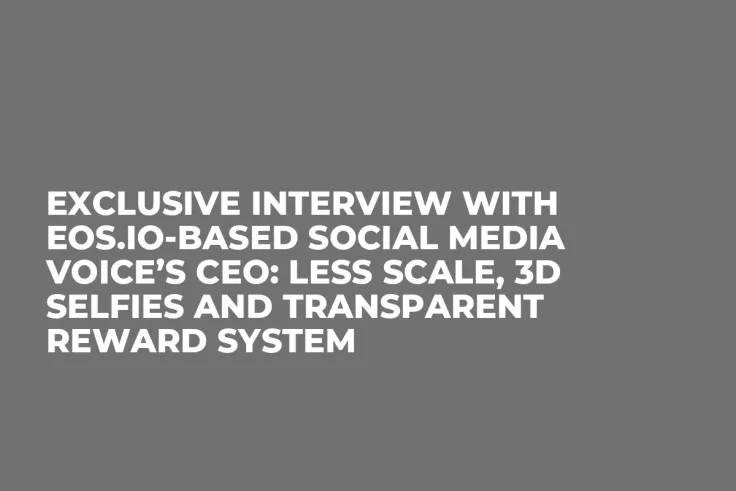
Nowadays, it is hard to find a person who does not have at least one social media account. Therefore solving the notorious data leakage problem is becoming the number one use case for modern social media. It is no surprise that this issue can be handled with the usage of a blockchain mechanism.
Last Saturday, a new social media platform based on EOS.IO blockchain, Voice.com, made another step forward, allowing its registered users to send invites to the platform to their friends and family members. I spoke with Salah Zalatimo, the CEO of Voice.com, and asked him about their expectations and prognosis regarding audience size, ways to avoid traffic and engagement cheats, KYC and manual moderation.
U.Today: Amid frequent accusations against Facebook of user data leakage, a new blockchain-based social media platform—Voice—has great chances of blowing up and becoming a favorite platform among social media users. What are your forecasts for the audience size for the upcoming year?
Salah Zalatimo: Unfortunately, we can't share our audience forecast for the year publicly, just yet. We look forward to doing that in the coming months. But we are very committed to building our platform for our core users first. And so our priority right now is less scale and more engagement.
We want to make sure that our token economy and our token system have had some time to mature, and we also want to focus on building the right core group of communities to help kick off this platform, because Voice is a platform that is built for and by its users.
We are democratizing social media. So it's not something that we can get right out of the gate and in a boardroom. It's something that we can only do properly by engaging our audience. And that process literally takes us to the next step tomorrow (Editor’s note: Starting from August 15, 2020, Voice allows its registered users to send invites to the platform to their friends and family members). I hope everyone that aligns with our mission can find us and get access to us quickly and early. But at this point, we are really focused on engagement.
U.Today: But are you going to attract the average user? I mean those who aren’t involved in cryptocurrencies yet.
Salah Zalatimo: Absolutely. I think those in the cryptocurrency community will more quickly appreciate the value that Voice brings. But the value that Voice brings is not the cryptocurrency itself. It's a more transparent and more accountable social media. So it will appeal to anybody who uses social media today and is frustrated with the way that the top ones are behaving. We think we can appeal to all of those users, whether they know what crypto is or not.
U.Today: How are you going to avoid traffic cheats/engagement cheats? Which mechanisms will be provided by your consensus algorithm?
Salah Zalatimo: That's an interesting point, the way you think about this. As a blockchain-based and cryptocurrency-focused, tokenized social media platform, security is one of our top priorities. And so we are very diligent about helping users protect their keys and creating a system where every interaction is a transaction and therefore auditable and viewable. So, we are designed specifically so that tokens are exchanged through transactions and it makes the ability to simply get fake traffic or engagement much more difficult because you need an account to transact. And for every account, we verify that it's a human being that's on the account. We work toward verifying identities as well.
U.Today: Will you use KYC?
Salah Zalatimo: Well, Know Your Customer specifically requires using government IDs to verify identities— that's specifically around the cryptocurrencies and the earnings piece of it. So, if our users would like to transfer their tokens off-platform, at that point, we will have to use KYC, but for users to just join the platform, you do not have to use KYC.
We've developed our own proprietary signup process, which we refer to internally as human signup. What the human signup process does is that it verifies that a human being is creating the account.
And then it helps us identify where any duplicate accounts may be created, because Voice is very specifically built to give each person a single account. That's how we maintain accountability and the quality of our community.
U.Today: Oh, that's interesting. How are you going to do that? How will you understand that these are different accounts created by one person?
Salah Zalatimo: Our human side of the process involves the creation of a 3D selfie. This 3D selfie is unique to each person and you have to create the 3D selfie in order to join. And, therefore, that 3D selfie verifies that you're actually a human being, and it can actually check and see if you have created an account before. If you have, it will then, in the background, flag that account. We'll reach out to you and ask you, first of all, to verify manually if this affects the same person. And if yes, we reach out to the user and ask them, you know, our policies are to only allow one account per user as part of how we protect our community. You know, is this an account for you? Yes or no. And if it is, we've removed the new one. So, we're taking a “trust, but verify” approach to it.
U.Today: Okay. And will there be manual moderation? I mean, will there be people whose responsibility is to moderate users’ posts, for example?
Salah Zalatimo: By democratizing social media, we're pushing that power back into the community.
However, we also have legal obligations to protect our community from very harmful content. And that requires us to have some level of human moderation.
But we do expect it to be a fraction of the types of manual moderation efforts that the largest social media companies have to employ because, as they say, “if you get low quality in you're going to get low quality out,” and that's probably a less nice way of saying that as well, but that's why we're so keen on implementing a humanity check at the gate—meaning you can only come in if you're a human and you cannot create fake accounts. We think that this action alone will remove the vast majority of the need for content moderation that current platforms have.
U.Today: How will your reward system work? Will this information be transparent and clear for a normal, novice user?
Salah Zalatimo: Yes, absolutely. We've already published the specifics about the way it works today on our FAQ and will continue to be transparent about any changes we make. It's a system that is still in progress, and we haven't yet finalized it or really solidified it because it's complex. So we are committed to being transparent as we continue to mature and to improve it.
U.Today: As for now, do you only have early access for U.S. citizens, and when will people from other countries be able to get access?
Salah Zalatimo: Actually, as of today, we have given access to 20 countries, and that list will continue to grow as we work with regulators in the different countries to ensure that we are compliant with their guidelines.



 Dan Burgin
Dan Burgin Vladislav Sopov
Vladislav Sopov